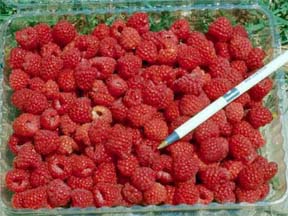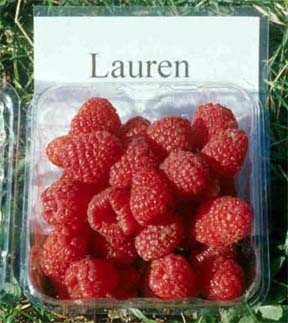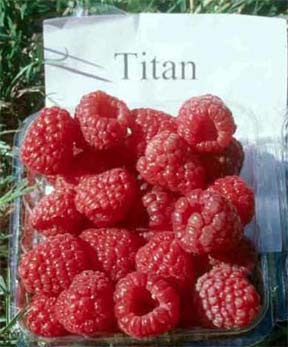Opportunities to diversify berry production in West Michigan with raspberries
Editor’s note: This article is from the archives of the MSU Crop Advisory Team Alerts. Check the label of any pesticide referenced to ensure your use is included.
Because of health benefits found in most berry fruits, raspberries are becoming another favorite fruit for fresh consumption. According to the Agricultural Marketing Resource Center raspberries are the third most popular berry consumed in the USA. They rank third behind strawberries and blueberries. In Michigan, until 2006 there were 500 acres planted with raspberries. Most of those acres are in southwest Michigan, especially Berrian County. In west Michigan, where most of the berries are produced, they are a potential berry crop that may provide diversity to blueberry farms. “U-pick” operations and small blueberry farms may benefit from adding another berry crop to their production units. This is especially important for small farms that rely on old blueberry varieties for processing, such as Ruble and Jersey, for their main income.
Under the present circumstances, mechanical harvested blueberries are having problems finding buyers or their prices are lower than blueberries for fresh pack. In comparison with the prices of blueberries for processing, raspberries have a more stable price. During the last three years, the average price for fresh raspberries was $1.66 per pound. A raspberry acre may produce on average 6,000 pounds.
Planting raspberries possesses some challenges. First, raspberries are very perishable fruit. Therefore, before planting, the grower needs to have a clear idea about where the berries are going to be marketed. West Michigan is a preferred destination for tourists from Michigan and neighboring states. So, during the summer there is a good number of people traveling along highway US-31 making frequent stops at fresh markets and “U-pick” farms on their way to destinations alongside Lake Michigan. This is a competitive advantage for berry growers in Van Buren, Ottawa, Muskegon, Oceana and other counties on Michigan’s West Coast. Also, there are some regional organizations such as the Greater Grand Rapids Food Systems Council that promotes and advertises the consumption of local grown produce. This includes a number of restaurants that offer their clientele foods prepared with locally grown, fresh produce. To market to retailers or local restaurants, fresh harvested raspberries need to be immediately refrigerated to maintain their quality. Raspberries last no more than a day if left unrefrigerated. Thus, the grower requires having a refrigeration unit available during harvest time.
Another competitive advantage for growers in West Michigan is their proximity to local wineries and bakeries. They buy frozen raspberries to prepare their products.
Raspberries require loamy soils with pH between 5.5 and 6.5. West Michigan soils fall within these parameters. Therefore, little soil modification is required in order to establish a raspberry plantation. Most blueberry farms modify the soil pH from 6 to 5.5 or 5 to make it suitable for blueberry production. Raspberries also require good irrigation and well-drained soils similar to those required by blueberries. This makes raspberries compatible with blueberry production in the same farm.
In Michigan, most exploited summer varieties are listed below.
Early season
Prelude is the earliest of the red raspberries to ripen and also have a fall crop. Very winter hardy canes with fruit flavor and quality rating very good.
Nova is an early ripening type with good winter hardiness and good disease resistant. Berries are medium to large size with good flavor and production.
Reveille is an early season variety that bears heavy crops of large fruit. Berries do not crumble when picked. Very tolerate to fluctuating temperatures and very winter hardy.
Killarney is a sister plant to Boyne. Very winter hardy and tolerates a wide range of climates. Fruit is firm, excellent quality and taste and ripens about a week later than Boyne.
Boyne is an extremely winter hardy variety. Very productive with sweet, dark red fruit.
Mid- to late season varieties
Canby is a hardy, thornless cultivar bearing big, brilliant red fruit.
Lauren shows better resistance to Phytophtora root rot and yields are much higher than Titan. Large fruit, heavy yields, long fruiting season and very good flavor
Titan is particularly susceptible to crown gall (Agrobacterium tumefaciens) and possibly forms of root rot (presumably Phytophthora spp.).
Latham has great flavor with large berries and is the most popular northern raspberry. It ripens at mid-season with good disease resistance
Encore is a nice large, late season fruit and quality and flavor are very good. Vigorous plant that is almost spineless with a good winter hardiness rating.
Black raspberries
Jewel and Bristol are the main varieties.
Fall varieties
Heritage bears fruit in the first year. It produces a light crop in the spring and heavy in the fall.
Autumn Bliss is a large, red raspberry with excellent flavor and heavy yields. It ripens two weeks before the Heritage.
Summer-bearing varieties produce one crop between July and August. Fall-bearing raspberries grow a large crop in the fall and a small crop the following summer.

“Canby” is a hardy, thornless cultivar bearing
big, brilliant red fruit.





 Print
Print Email
Email



